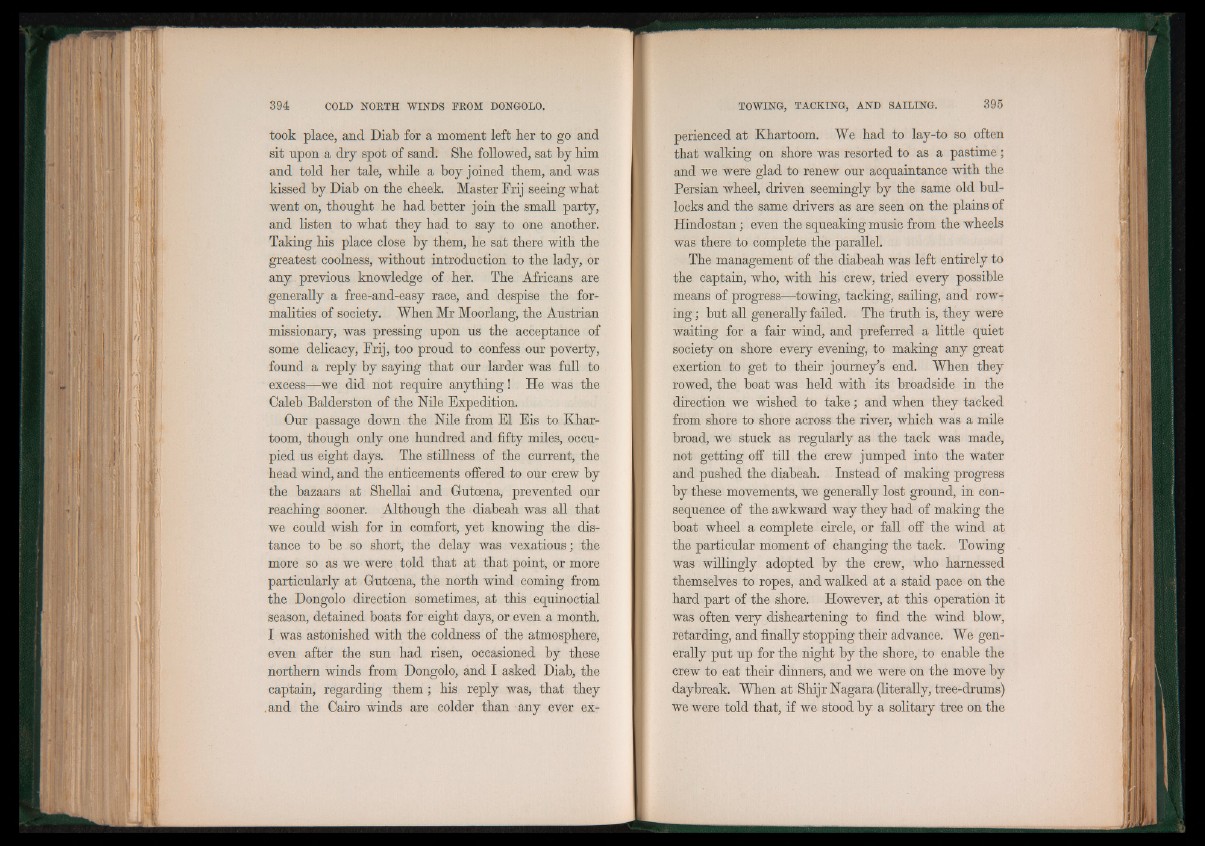
took place, and Diab for a moment left her to go and
sit upon a dry spot of sand. She followed, sat by him
and told her tale, while a boy joined them, and was
kissed by Diab on the cheek. Master Frij seeing what
went on, thought he had better join the small party,
and listen to what they had to say to one another.
Taking his place close by them, he sat there with the
greatest coolness, without introduction to the lady, or
any previous knowledge of her. The Africans are
generally a free-and-easy race, and despise the formalities
of society. When Mr Moorlang, the Austrian
missionary, was pressing upon us the acceptance of
some delicacy, Frij, too proud to confess our poverty,
found a reply by saying that our larder was full to
excess—we did not require anything! He was the
Caleb Balderston of the Nile Expedition.
Our passage down the Nile from El Eis to Khar-
toom, though only one hundred and fifty miles, occupied
us eight days. The stillness of the current, the
head wind, and the enticements offered to our crew by
the bazaars at Shellai and Gutoena, prevented our
reaching sooner. Although the diabeah was all that
we could wish for in comfort, yet knowing the distance
to be so short, the delay was vexatious; the
more so as we were told that at that point, or more
particularly at Gutoena, the north wind coming from
the Dongolo direction sometimes, at this equinoctial
season, detained boats for eight days, or even a month.
I was astonished with the coldness of the atmosphere,
even after the sun had risen, occasioned by these
northern winds from Dongolo, and I asked Diab, the
captain, regarding them; his reply was, that they
and the Cairo winds are colder than any ever experienced
at Khartoom. We had to lay-to so often
that walking on shore was resorted to as a pastime ;
and we were glad to renew our acquaintance with the
Persian wheel, driven seemingly by the same old bullocks
and the same drivers as are seen on the plains of
Hindostán; even the squeaking music from the wheels
was there to complete the parallel.
The management of the diabeah was left entirely to
the captain, who, with his crew, tried every possible
means of progress—towing, tacking, sailing, and rowing
; but all generally failed. The truth is, they were
waiting for a fair wind, and preferred a little quiet
society on shore every evening, to making any great
exertion to get to their journey’s end. When they
rowed, the boat was held with its broadside in the
direction we wished to take; and when they tacked
from shore to shore across the river, which was a mile
broad, we stuck as regularly as the tack was made,
not getting off till the crew jumped into the water
and pushed the diabeah. Instead of making progress
by these movements, we generally lost ground, in consequence
of the awkward way they had of making the
boat wheel a complete circle, or fall off the wind at
the particular moment of changing the tack. Towing
was willingly adopted by the crew, who harnessed
themselves to ropes, and walked at a staid pace on the
hard part of the shore. However, at this operation it
was often very disheartening to find the wind blow,
retarding, and finally stopping their advance. We generally
put up for the night by the shore, to enable the
crew to eat their dinners, and we were on the move by
daybreak. When at Shijr Nagara (literally, tree-drums)
we were told that, if we stood by a solitary tree on the